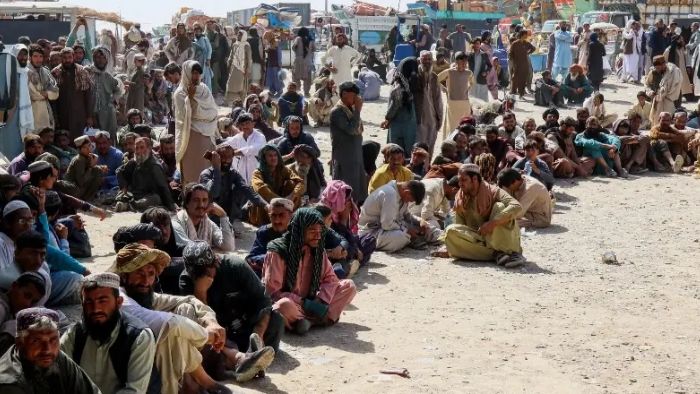
ISLAMABAD: Chagai and Quetta in Balochistan and Attock in Punjab were the top three districts across the country where most of Afghan Citizen Card (ACC) holders or undocumented Afghan nationals were arrested or detained in over 10 months this year, says a UN refugee agency report.
The highest number of arrests or detentions were made in 2025, the report says, adding that a total of 100,971 Afghans were arrested from Jan 1 to Nov 8, 2025, whereas 9,006 Afghans were detained in 2024. In 2023, 26,299 Afghans were arrested.
The UNHCR report, which was released on Friday, says that prior to 2023, there was no data collected on the arrest and detention of Afghan Citizen Card (ACC) holders or undocumented Afghan nationals. Since January 2023, International Organisation for Migration (IOM) has started to collect this data.
From Nov 2 to 8, a total of 13,380 Afghan nationals were arrested and detained, marking a 72 per cent increase compared to the previous week. Out of all arrests and detentions during Nov 2 to 8, the ACC holders and undocumented Afghans represented 76pc of the total arrest and detentions, and Proof of Registration (PoR) holders represented 24pc.
During the reporting period of Nov 2 to 8, 41pc of the total reported arrests and detentions took place in Balochistan, and 43pc in Punjab.
Key findings of UNHCR report says cumulatively, from September 15, 2023, to November 8, 2025, 1,723,481 individuals have returned to Afghanistan. During the period November 2 to 8, UNHCR and IOM say 55,768 Afghans returned through the Torkham, Ghulam Khan (located in Khyber Pakhtunkhwa), Chaman, Badini and Bahramcha (located in Balochistan) border crossing points to Afghanistan.
Between Nov 2 and 8, the number of returns and deportations rose by 49pc and 75pc, respectively, compared to the previous week of Oct 26–Nov 1 (37,448 returns including 7,733 deportations). From Nov 2 to 8, the figures reached 55,768 returns, including 13,548 deportations.
The increase in returns is attributed to the reopening of the Torkham border on Nov 1, which allowed more Afghan returnees to cross into Afghanistan. However, the overall number of Afghan returnees during this reporting period still remain more moderate compared to the peaks observed in late August and September.
For the returns from Nov 2 to Nov 8, most of the returnees were PoR holders (48pc) followed by undocumented (43pc) and ACC holders (9pc). Majority of the POR returns include those facilitated by UNHCR through the Voluntary Repatriation Centres (VRCs).
For the deportees from Nov 2 to 8, most were undocumented (84pc), followed by PoR holders (13pc) and ACC holders (3pc).
Since April 1, this year, 869,448 Afghan nationals returned to Afghanistan, of which 115,159 (13pc) were deported. During this period, fear of arrest remained the main reason for the return among undocumented individuals and ACC holders (93pc) as well as PoR holders (47pc).
During the same time period, returnees were most likely to return from Quetta (20pc); Attock (13pc) and Islamabad (9pc) in the country and intend to go to Kunduz (19pc), Nangarhar (18pc) and Kabul (17pc) in Afghanistan.
In 2025, the Pakistan government issued several directives impacting Afghan nationals. In January, the government announced that Afghan nationals should relocate from Islamabad Capital Territory (ICT) and Rawalpindi, or else face deportation.
In April, further announcements indicated the implementation of the second phase of the “IFRP”, targeting ACC holders, in addition to undocumented Afghans.
In July, the government issued a Statutory Regulation Order (SRO) directing the repatriation/deportation of PoR card holders following the expiry of PoR card validity on June 30. The government later indicated a deadline of Sept 1 for PoR holders to leave Pakistan, before the start of the repatriation/deportation process.
434 shifted to refugee camp
As police raids continued in different parts of Balochistan, a total of 434 Afghan nationals were taken into custody in Nokundi, officials said.
Acting on a tip-off, they said, the law enforcement agencies raided a residence in Killi Burhanabad, Nokundi, where the Afghan nationals were hiding. Upon seeing the police, the house owner, Sarfaraz, who belongs to Burhanzai tribe, along with three unidentified suspects fled. However, police detained around 200 Afghans during the operation and registered an FIR.
In a subsequent operation, police raided the residences of Khaleel Ahmed and Attaullah, sons of Sher Ali, and took at least 234 Afghan nationals into custody. All detainees were later transferred under police supervision to the Girdi Jungle Refugee Camp for deportation proceedings.
Saleem Shahid from Quetta also contributed to this report
